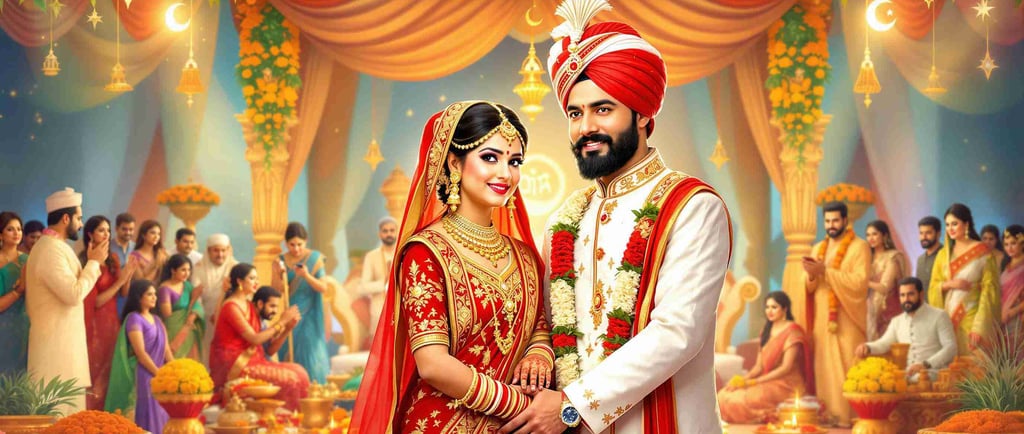Navigating Cultural and Religious Differences in Marriage: The Indian Context
In a diverse country like India, marriage often brings together not just two individuals but two unique worlds of traditions, beliefs, and values. While this diversity can enrich a relationship, it can also pose challenges if not addressed early on. Read the article to understand how cultural and religious differences can impact marriages and how proactive communication can transform challenges into growth opportunities.
12/23/20243 min read


Marriage is often described as the union of two souls, but in reality, it is also the coming together of two families, traditions, and belief systems. In a culturally rich and diverse country like India, where religion and tradition play a significant role in daily life, marriages often transcend personal compatibility and delve into the realm of cultural and religious harmony. While such diversity can enrich a relationship, it can also pose challenges that, if left unaddressed, may strain the bond between partners.
Understanding and addressing these differences early on can pave the way for a harmonious and fulfilling marriage. This is where pre-marital consultations can play a transformative role.
Cultural and Religious Differences in Indian Marriages
India is home to a multitude of religions, languages, and traditions. While this diversity is a source of pride, it can also lead to misunderstandings and conflicts in a marriage. Here are some common areas where cultural and religious differences can impact a relationship:
1. Religious Practices and Rituals
In India, religion is deeply intertwined with daily life. For instance, a Hindu partner may observe fasting on certain days, while a Muslim partner may follow specific dietary restrictions, such as avoiding pork or consuming only halal food. Similarly, a Christian partner may prioritize attending church on Sundays, while a Sikh partner may have commitments to gurdwara services. These differences, if not discussed beforehand, can lead to confusion or even resentment.
Example: A Hindu-Muslim couple may face challenges during festivals like Diwali or Eid, where the expectations of family involvement and celebration styles differ significantly. Without mutual understanding, such occasions can become sources of tension rather than joy.
2. Family Expectations and Traditions
In Indian marriages, families often play a central role. From wedding ceremonies to post-marriage rituals, family traditions can vary widely. For instance, a Tamil Brahmin wedding may involve elaborate rituals lasting several days, while a Punjabi wedding might focus on grand celebrations and dancing. Adjusting to these differences requires patience and open communication.
Example: A Bengali groom marrying into a Gujarati family might find it challenging to adapt to the vegetarian food preferences of his in-laws, especially if he is accustomed to a fish-based diet. Similarly, the Gujarati family might struggle to understand the importance of certain Bengali customs.
3. Language and Communication
India’s linguistic diversity can also pose challenges in a marriage. While English or Hindi may serve as a common language, the emotional connection to one’s mother tongue cannot be underestimated. Miscommunication or a lack of effort to learn each other’s language can create a sense of alienation.
Example: A Kannada-speaking bride marrying a Marathi-speaking groom might feel excluded during family gatherings if she cannot understand the conversations. This can lead to feelings of isolation and frustration.
4. Parenting and Lifestyle Choices
Cultural and religious beliefs often influence parenting styles and lifestyle choices. Decisions about children’s education, religious upbringing, and even daily routines can become contentious if not discussed beforehand.
Example: A couple from different religious backgrounds might struggle to decide whether their child should follow one religion, both, or neither. Such decisions can become even more complicated when extended family members have strong opinions.
The Role of Pre-Marital Consultations
Given the potential challenges, how can couples prepare for a life together while respecting their cultural and religious differences? Pre-marital consultations offer a safe and structured space for couples to explore these issues and develop strategies to address them.
1. Open Communication
Pre-marital consultations encourage couples to have honest conversations about their beliefs, values, and expectations. This helps them identify potential areas of conflict and work towards solutions before they become major issues.
2. Building Empathy and Understanding
By discussing each other’s cultural and religious practices, couples can develop a deeper appreciation for their partner’s background. This fosters empathy and reduces the likelihood of misunderstandings.
3. Setting Boundaries and Expectations
Consultations can help couples set clear boundaries and expectations regarding family involvement, religious practices, and lifestyle choices. This ensures that both partners feel respected and valued.
Conclusion
In a country as diverse as India, cultural and religious differences are inevitable in many marriages. However, these differences need not be a source of conflict. With mutual respect, open communication, and a willingness to learn, couples can turn these challenges into opportunities for growth and enrichment. Pre-marital consultations provide the tools and guidance needed to navigate these complexities, ensuring that love and understanding remain at the heart of the relationship.
After all, a successful marriage is not about erasing differences but about embracing them and building a life that celebrates the unique blend of two worlds.
